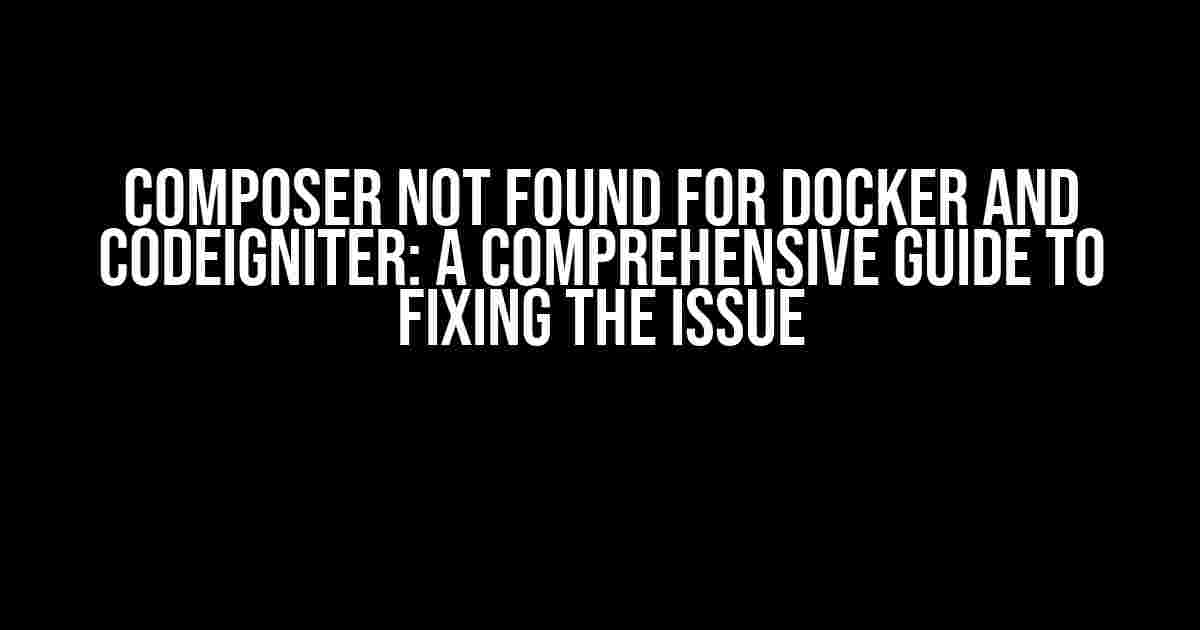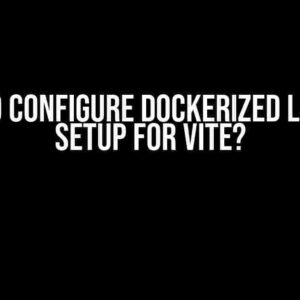Are you stuck with a frustrating error message “composer not found” while trying to integrate Docker with CodeIgniter? Don’t worry, you’re not alone! Many developers have encountered this issue, and in this article, we’ll walk you through a step-by-step guide to resolve it once and for all.
- The Problem: Composer Not Found Error
- Step 1: Install Composer and Docker Correctly
- Step 2: Configure the Docker Container
- Step 3: Set Environment Variables and PATH Settings
- Step 4: Run the Docker Container and Verify Composer Installation
- Step 5: Update CodeIgniter to Use Composer
- Conclusion
- Additional Resources
- FAQs
The Problem: Composer Not Found Error
The “composer not found” error typically occurs when you’re trying to run a command like composer install or composer update within a Docker container. This error message indicates that the system cannot locate the Composer executable, which is essential for managing dependencies in your CodeIgniter project.
Why Does This Happen?
There are several reasons why you might encounter this issue:
- Improper installation of Composer or Docker
- Incorrect configuration of the Docker container
- Missing environment variables or PATH settings
- Incompatible versions of Composer and CodeIgniter
Step 1: Install Composer and Docker Correctly
Before we dive into the solution, make sure you have installed Composer and Docker correctly on your system.
Install Composer
Download the Composer installer from the official website (https://getcomposer.org/download/) and follow the installation instructions.
php -r "copy('https://getcomposer.org/installer', 'composer-setup.php');"
php -r "if (hash_file('sha384', 'composer-setup.php') === '55d6e61ff9798038669f09ea412e91dfa8551f55f5e08f092f23b36d25a80a') { echo 'Installer verified'; } else { echo 'Installer corrupt'; unlink('composer-setup.php'); } echo PHP_EOL;"
php composer-setup.php
php -r "unlink('composer-setup.php');"
Install Docker
Download and install Docker from the official website (https://docs.docker.com/get-docker/). Make sure to follow the installation instructions for your operating system.
Verify that Docker is installed correctly by running the command:
docker --version
Step 2: Configure the Docker Container
Create a new Dockerfile for your CodeIgniter project and add the following lines:
FROM php:7.4-fpm # Set working directory to /app WORKDIR /app # Install dependencies RUN apt-get update && apt-get install -y libzip-dev zip && rm -rf /var/lib/apt/lists/* # Install Composer RUN curl -sS https://getcomposer.org/installer -o composer-setup.php RUN php composer-setup.php --install-dir=/usr/local/bin --filename=composer RUN rm -rf composer-setup.php # Set environment variables ENV COMPOSER_HOME=/app/composer ENV COMPOSER_CACHE_DIR=/app/composer/cache # Copy the application code COPY . /app/ # Run Composer install RUN composer install --no-dev --prefer-dist # Expose the port EXPOSE 80 # Start PHP-FPM CMD ["php-fpm"]
This Dockerfile installs PHP 7.4, sets up the working directory, installs Composer, and copies the application code. It also exposes port 80 and starts PHP-FPM.
Step 3: Set Environment Variables and PATH Settings
In your Docker container, set the environment variables and PATH settings to ensure that the system can locate the Composer executable.
ENV PATH=$PATH:/usr/local/bin ENV COMPOSER_HOME=/app/composer ENV COMPOSER_CACHE_DIR=/app/composer/cache
Step 4: Run the Docker Container and Verify Composer Installation
Build the Docker image using the following command:
docker build -t mycodeigniterapp .
Run the Docker container:
docker run -p 8080:80 -v $(pwd):/app mycodeigniterapp
Verify that Composer is installed correctly by running the command:
docker exec -it mycodeigniterapp composer --version
This should display the version of Composer installed in your Docker container.
Step 5: Update CodeIgniter to Use Composer
Update your CodeIgniter project to use Composer by adding the following lines to your composer.json file:
{
"name": "mycodeigniterapp",
"description": "My CodeIgniter Application",
"require": {
"codeigniter/framework": "^3.1.11"
}
}
Run the command to update your CodeIgniter project:
docker exec -it mycodeigniterapp composer update
Conclusion
By following these steps, you should be able to fix the “composer not found” error and successfully integrate Docker with CodeIgniter. Remember to update your Docker container and CodeIgniter project regularly to ensure that you have the latest versions of Composer and dependencies.
| Common Errors | Solutions |
|---|---|
| Composer not found | Verify Composer installation, set environment variables, and update PATH settings |
| Docker container not running | Check Docker container logs, ensure correct Dockerfile, and verify port exposure |
| CodeIgniter dependencies not updated | Run composer update command and verify composer.json file |
We hope this comprehensive guide has helped you resolve the “composer not found” error and successfully integrate Docker with CodeIgniter. If you encounter any further issues, feel free to ask in the comments below!
Additional Resources
For further learning and troubleshooting, we recommend the following resources:
FAQs
Q: What is the purpose of the WORKDIR instruction in the Dockerfile?
A: The WORKDIR instruction sets the working directory for the Docker container. In this case, it sets the working directory to /app, which is where the CodeIgniter project is located.
Q: Why do I need to install Composer globally in the Docker container?
A: Installing Composer globally ensures that the executable is available system-wide, allowing you to run Composer commands within the Docker container.
Q: Can I use a different version of PHP or CodeIgniter?
A: Yes, you can use different versions of PHP or CodeIgniter by updating the Dockerfile and composer.json file accordingly. However, ensure that the versions are compatible with each other.
Q: What if I encounter issues with my CodeIgniter project after integrating with Docker?
A: Check the CodeIgniter documentation and troubleshoot the issue. You can also seek help from the CodeIgniter community or online forums.
Here are 5 Questions and Answers about “composer not found for docker and codeigniter” in a creative voice and tone:
Frequently Asked Question
Having trouble with Composer when using Docker and CodeIgniter? Don’t worry, we’ve got you covered! Check out these FAQs to get back on track.
Why is Composer not found when I run it in my Docker container for CodeIgniter?
This is likely because Composer is not installed in your Docker container. You can fix this by adding a `RUN` command in your Dockerfile to install Composer, like this: `RUN curl -sS https://getcomposer.org/installer | php && mv composer.phar /usr/local/bin/composer`.
How do I install Composer in my Docker container for CodeIgniter?
You can install Composer in your Docker container by adding the following lines to your Dockerfile: `RUN curl -sS https://getcomposer.org/installer | php && mv composer.phar /usr/local/bin/composer` and then `RUN composer install` to install the dependencies specified in your `composer.json` file.
Why do I get a “Composer could not be found” error when running it in my Docker container for CodeIgniter?
This error occurs when the system can’t find the Composer executable. Make sure you’ve installed Composer in your Docker container (as mentioned above) and that the `composer` command is in your system’s PATH. You can check the PATH by running `echo $PATH` in your terminal.
How do I update my CodeIgniter project to use Composer dependencies in my Docker container?
To update your CodeIgniter project to use Composer dependencies, create a `composer.json` file in your project root and specify the dependencies you need. Then, run `composer update` to download and install the dependencies. Finally, update your `autoload.php` file to include the Composer autoloader.
What’s the benefit of using Composer with Docker and CodeIgniter?
Using Composer with Docker and CodeIgniter allows you to easily manage dependencies for your project, ensuring consistency across different environments. It also makes it easy to update dependencies and manage versions, which is especially useful in a Dockerized environment.


